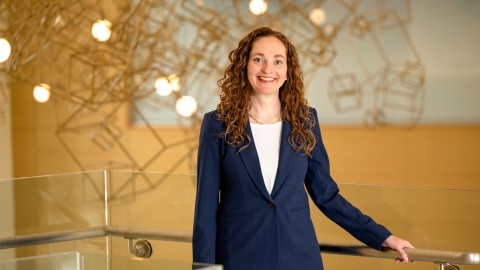
Annetta Grant, Markets, Innovation & Design
July 19, 2023
Professor Annetta Grant is one of Poets&Quants for Undergrads' "50 Best Undergraduate Business School Professors of 2024." Photo by Emily Paine, Marketing & Communications
"The way we look at our homes today is different than how we looked at them a couple of decades ago. A big finding in my research is that people have an increasing unease with the insides of their homes, and a growing desire to have them look like the perfect show home."
Those granite countertops and shiplapped walls aren't just for you.
Today's homeowners are spending more than ever on upgrades and renovations, but their reasons for doing so aren't the same as a few decades ago. According to Professor Annetta Grant, markets, innovation & design, thanks largely to the popularity of HGTV shows like Fixer Upper and Love It or List It as well as home-focused magazines, homeowners are more attuned than ever to how others perceive their abodes. And that desire to keep up appearances motivates them to spend.
"In a lot of these shows it's not uncommon for a camera crew to walk through someone's home while the host points out everything that's wrong with it — what kind of people would have a countertop like that, you know?" she says. "It creates the sentiment that not only are professionals looking at your home with a critical eye, but that people you know could be criticizing your home — your friends and even your family."
An ethnographer by training, Grant's research is based on in-depth interviews with homeowners who are doing renovation projects. Across the board, they tend to report having a place inside their home that they'd be embarrassed to show guests. That holds true regardless of how frequently they have visitors or the likelihood that guests will actually see those spaces, she says.
Those perceptions spill into the residential real estate market, with home-buyers increasingly preferring move-in ready homes to fixer-uppers. And the shift to working and studying at home during the COVID-19 pandemic only seems to have heightened the effect, Grant says.
"People are spending more time at home, which gives them more time to notice things they don't like," she says. "But perhaps more importantly, what's happening now is that coworkers who have never been in your home are suddenly zooming into your living room. Kids are carrying laptops or tablets around the house while they talk to their teachers and classmates.
"A lot more people are seeing the insides of each other's homes for the first time, and that seems to exacerbate the unease or embarrassment people might feel. If they were thinking about doing a renovation project, it might prompt them to do it just a little bit more quickly."
While economists have devoted significant attention to tracking exactly how much people are spending on renovations and repairs, Grant says we understand very little about their drive to do so. Her research into markets and trends is trying to remedy that.
"At the root of any really good marketing strategy is a deep understanding of consumers in their cultural context," she explains. "I'm curious about the things we take for granted." Her research delves into how culture and cultural norms shape consumer behavior.
In the case of home renovation, people often make financial sacrifices to invest in upgrades, so Grant has looked at the "cultural imperative" that supports spending money on replacements for products that may not be worn out. In her backpack travels in Central and South America, the cultural view of obsolescence she observed was very different, she notes. Understanding the consumption experience and consumers as well as how place shapes consumption practices can be used to enlighten strategic and managerial perspectives.
Grant's experience isn't all in the world of academia. Before joining Bucknell she worked in marketing with Cirque du Soleil and Shell Canada, among other organizations. Those experiences and her research inform her teaching at Bucknell, where the low student-to-professor ratio allows her to "work closely with students, get to know them and impact change with them."
While she's been in the field for years, Grant continues to enjoy challenging perceptions and thinking about the world in new ways. Working with students on developing that type of outlook is also about developing critical thinking skills, she says. "As a researcher and teacher, I'm most happy when I'm helping to question a taken-for-granted perspective on the world and to inspire new ways of thinking."

